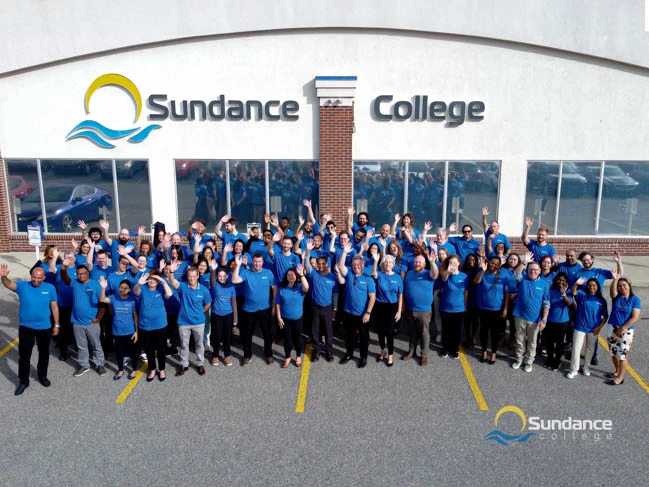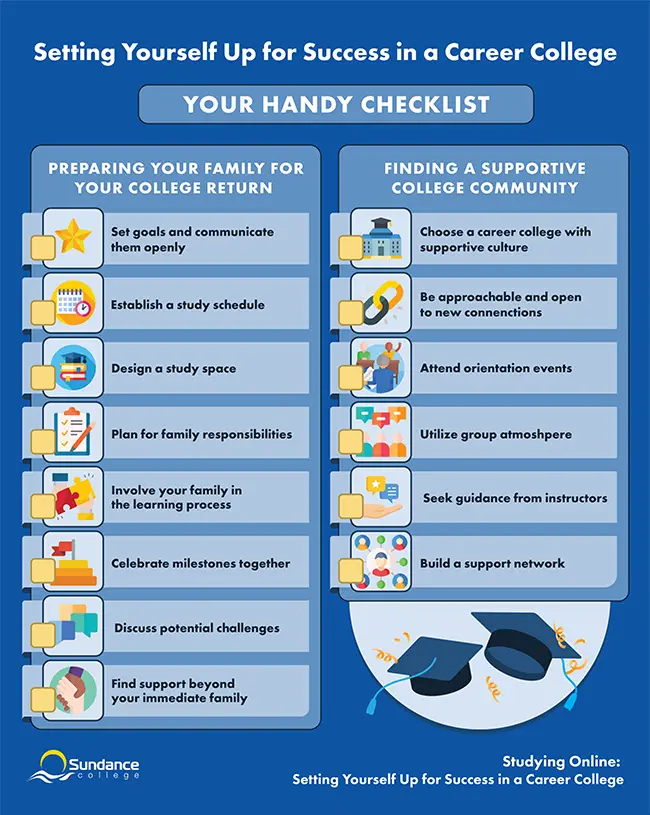Blog / How to Set Yourself Up for Success in a Career College (With a Checklist)
How to Set Yourself Up for Success in a Career College (With a Checklist)

Explore our Diploma Programs
- Business, Hospitality, and Legal
- Health and Human Services
- Technology
Table of Contents
Going back to college might feel like a leap into the unknown. You may be thinking only those who have high grades from high school can secure a career college diploma; or those who are single, child-free, unemployed, and have lots of free time to study a new profession; or who are like superheroes with incredible determination to achieve results.
Our alumni success stories tell a different tale. You don’t need an academic gold star, a commitment-free schedule, or superpowers to succeed in a career college. You need personal self-discipline, motivation, and time management skills. In addition, there are support systems that can assist you.
How can you enlist this support? In this article, we share a guide on how to prepare your family and friends for your college comeback as well as how to build a solid academic support network at college to successfully complete your diploma program.
Family Support in College Can Help You Succeed

Once you say, “Okay, I’m heading back to college, hon”, everyone, even your little ones, gets it: There will be more “self” and less of “you” for them at times. There might be no “you” for morning hair braiding, family dinners, or weekend bike rides to your favorite park.
There will likely be some changes to you and your family’s patterns and schedules once the decision to return to college has been made. To do this smoothly, you will want to discuss things in advance, lay out the plan, and make sure everyone is on the same page.
Steps to Prepare Your Family for Your College Return
Picture this: You gather everyone around the kitchen table and announce: “I’ve decided to enroll in a one-year career training program.” Once you spell that out, a flood of questions ensues:
- Who will pick up our kid from school?
- How do we manage the after-school activities?
- Who will cook?
- Who will walk the dog?
- When and where will you study?
With so much to discuss, it’s easy to miss something. Yet, you may not have the right answers at the moment. So don’t rush into this conversation unprepared.
Here is our breakdown of steps you need to take to discuss all the ins and outs. At the end of this article, you can find our infographic specifically designed as a handy checklist. Feel free to download and print it out, marking items off as you navigate the discussions with your family, and then as you explore the college faculty guidance for students.
Open Communication And Goal Setting
The number one thing you need to address is your why. It’s essential for both you and your loved ones to clearly understand what benefits the upcoming changes, brought about by your college studies, will ultimately bring to your life.
If you’re currently working a low-wage job to make ends meet, your goal might be achieving some financial freedom through a more rewarding career. Communicate this to your kids: “Mom will be occupied with her studies for a while, but in the end, we can afford much more of what you’re dreaming of, like buying an iPad.”
Consider the impact on your spouse; your new employment and higher income may enable them to quit a second job, pursue a new career, or free up the time to prioritize their health with a gym membership.
Finally, outline the personal purposes of your college studies: better skills, better jobs, better lives. Formulate the benefits and ultimate outcomes your career education will bring to you and your family, print it out, and display it prominently. This visual reminder will keep everyone aligned with the positive changes ahead.
Establishing A Study Schedule
To successfully navigate your career training courses, our Director of Curriculum Taylor L. recommends initially allocating 30 hours per week. You can adjust this schedule as needed to align with your goals. Keep in mind that most people can focus effectively for three to four hours at a stretch, with a minimum of 25 minutes required to truly engage with a subject. Therefore, planning study sessions lasting between 25 minutes and 4 hours is optimal, as studying for longer or shorter periods of time in a single block may be less effective.
Inform your family that you’ll need approximately 2-4 hours per day for studying, and during this time, it’s best not to be disturbed. Reflecting on her experience as a student, Pharmacy Assistant program graduate with honours, Alyssa C. shared:
“I wasn’t sure if I was going to be good enough with grades because I didn’t have the best grades in high school. My family helped me overcome my fears. They just kept encouraging me and my studies and they left me alone if I needed that time to study.”
Designating A Study Space
Selecting the right environment for your studies can significantly impact your focus and productivity, and ultimately – your academic success.
Here are some key considerations to help you design an effective study space:
- Choose a quiet and comfortable area with minimal distractions
- Keep all your study materials and essentials well-organized
- Personalize your study space with items that motivate and inspire you
- Ensure the room is well-ventilated to keep your mind fresh and focused
- Communicate with your family about the importance of an undisturbed study environment during your designated study hours.
For example, to help another of our Pharmacy Assistant graduates, Minerva C., secure a diploma with honours, her husband went above and beyond:
“My husband always gives me support by giving me one room where I could study by myself, quietly. No kids or pets are allowed. My job is 12 hours from the hospital, so after 7 a.m. to 7 p.m., then I go back, I go to the room, and study. That’s the time that I studied for at least 3 hours.”
Planning For Family Responsibilities

Balancing college and family responsibilities requires careful planning. Start by listing all your commitments, including:
- Childcare
- Household chores
- Current work duties
- Other commitments
Identify tasks that might be challenging due to your study workload and discuss them with your family. Establish clear expectations and delegate tasks among family members. A well-thought-out plan may help you reach a harmonious blend of family life and academic pursuits.
Involving Family In The Learning Process
Let’s consider one of our graduates’ support experiences. Marla S., a graduate of our Addictions and Community Health Professional program, successfully managed her studies while raising five(!) children. She recalls:
“My studying was sometimes challenging. But I’m fortunate that I have older ones that were able to help out. They all rallied behind me and supported me in whatever I needed. And they worked out, even though I was in my office 8 hours a day studying. They, you know, they took care of the rest of the stuff.”
Perhaps you can involve your loved ones in your learning journey too. They can assist with the technical aspects if they are more tech-savvy, play the role of your patient during hands-on learning practices, or help you prepare for exams by conducting tests and quizzes to better your information assimilation.
Celebrating Milestones Together
Acknowledging and celebrating your wins, no matter how small, as a family is an essential part of success strategies for college achievements.
For example, at Sundance College, you’ll be introduced to a modular-based learning system that allows you to focus on one course at a time. This allows – and we encourage – our students to view each course completion as a significant milestone and celebrate it with their family and friends.
Marking your study victories with your family will help you cultivate a collective sense of unity and motivation, which is critical for sustained progress on your journey toward a new career.
Discussing Opportunities For Family Support And Collaboration
Beginning the exciting journey of mastering a new profession at a career college, while managing a job and family commitments, is truly commendable. Dedicating 2-3 hours daily for a year demonstrates immense dedication and strength. Navigating these responsibilities often deepens communication and understanding with your loved ones, turning challenges into opportunities for growth.
Encouraging open communication is key. Everyone should feel free to express their feelings and concerns without fear of judgment. This will help you set up clearer communication and essential emotional support within your family, which will not only enhance your overall well-being but also significantly contribute to nurturing academic success.
Finding Support Beyond The Family
Sometimes, immense family encouragement for students-to-be can come from a simple yet powerful phrase, “You can do it!”. More often, our family and friends are ready to provide substantial support in more significant ways than words. Just as Minerva recalls,
“It started with my mom telling me, ‘If you can do it, then just go.’ She always believes in me. Then my husband and sister say, ‘You can do it because you’re smart. We believe in you, and we know you’ll make it through.’ They are my biggest support. So, when I asked my friend and sister about going back to college, they assured me they would make time for me to study.”
Taking a cue from Minerva’s experience, consider seeking support beyond your immediate family. Perhaps, your uncle or a colleague from your current workplace can assist with your kids’ commute to school. Maybe friends could take your kids out on weekends. Your sister might help with household chores, or your grandma could cook some delightful meals for your family from time to time.
To sum up, the key takeaway of the above-described college success tips is not to shoulder everything alone – ask for help!
College Support System – A Pillar for Your Success

Enlisting support from family and friends is just the beginning of your college journey. Establishing a strong connection with the college faculty is equally important. So, first, you need to choose the right college.
After making your decision, take steps to build meaningful relationships within the college community. These connections will not only enhance your academic experience but elevate your chances of getting a dream job. So, how can you do it?
Steps to Find a Supportive College Community
When seeking advice from our faculty on effective student success strategies, they always emphasize effective communication among other things. Let’s explore all the steps you should take to reach success through collaboration with a supportive college community during your educational journey.
Be Approachable And Open To New Connections
Consider the following aspects to embody approachability and openness in your college interactions:
- Friendly Demeanor: A warm and friendly attitude can make a significant difference. Smile, greet your peers, and engage in small talk. Simple gestures go a long way in creating a positive and approachable image.
- Active Listening: When engaging in conversations, practice active listening. Demonstrate a genuine interest in what others have to say. This not only helps you understand your fellow students better but also establishes you as someone approachable and receptive.
- Initiate Conversations: Don’t hesitate to take the first step. Initiate conversations with your classmates, instructors, and other staff members. Expressing interest in others cultivates a welcoming environment.
- Be Open to Collaboration: In a college setting, collaboration is key. Be open to working with your peers on projects or assignments. Embrace diverse perspectives and contribute positively to group dynamics.
Attend Orientation Events
The beginning of your journey in a career college sets the tone for your entire academic experience.
Attending orientation events, such as “Become a Master Student” at Sundance College, is not just a formality; it’s an opportunity to navigate academic waters effectively and lay a strong foundation for your future career success. During your orientation sessions:
- Connect with your fellow students, instructors, and the broader college community.
- Learn about the resources available, understand college culture, and start building valuable relationships.
- Explore the college resources at your disposal. Understand on-campus facilities, online databases, and college life support services.
- Ask questions about your courses, expectations, and academic structure. Seek guidance on how to approach your studies effectively.
Utilize Group Atmosphere To Enhance Your Learning
Harnessing the power of a group atmosphere can significantly elevate your learning experience in a career college. Sundance College recognizes the importance of this collaborative approach. Our graduate Marla S., who graduated with honours from the Addictions and Community Health Professional program, speaks just about that:
“You feel supported by the staff, the instructors, and other classmates because a lot of them are in the same boat. And so, everybody sorts of rallies together. You make your own little study groups. It’s perfect.”
How can you take advantage of a group atmosphere while at college? Here are some steps to take:
- Build friendships in college with peers who understand your journey because they are on a similar path and get support from their experiences
- Share insights on effective study habits, discuss the coursework, and provide mutual support to enhance your understanding of course materials.
Seek Guidance From Instructors

Navigating the coursework becomes more manageable when you actively seek guidance from your instructors.
For example, Minerva had no love for math but needed to study fractions and more in her Pharmacy Assistant courses. She said the Sundance College faculty’s impact on students like her made a difference:
“When I was struggling with the pharmacology and the computations, my instructor was there every time we asked questions, she gave us examples and explained them properly, so we understood what we were doing, and what formula was needed. And with the Kroll pharmacy management system, another pharmacy instructor helped us. She kept following us or telling us what kind of things we were going to do. Those instructors really gave us a good understanding of what kind of books we need. That was a real big help for us.”
Always remember that seeking guidance isn’t a sign of weakness; it’s a demonstration of wisdom. Industry-experienced instructors are here to address specific questions, explain concepts thoroughly, and offer additional resources and motivational support for students to enhance the overall understanding of their future career specifics. All you need is to ask them!
Build A Support Network
Starting college is like starting an exciting adventure. Imagine you have a map to guide you — your effort is the vehicle, and college support is the fuel that keeps it going.
Your journey can be amazing if you actively seek help and choose a reliable career college. That’s what our graduate Alyssa experienced while being with us:
“Colleges are all the same, but it’s the support. It’s always going to be the support no matter where you go. I found more support at Sundance than I would anywhere else. I was able to not only still work part-time or full-time but was able to also stay up late and finish my studies, which was nice, and it was super accommodating. Whenever I had questions, it was always the instructors who said, ‘Oh, just email us, and we will answer your questions, or call us on Microsoft Teams.’ I wasn’t afraid to ask them questions. 24/7, they were super supportive of the entire process. I thought I was going to have the worst grades, but I ended up graduating with honours.”
To help you stay on track during your educational journey and reach your destination, we’ve designed a simple checklist. It includes the important steps to reach success with loved ones’ support and the college support system. You can download and print it out to check off each step.

Reach Your Academic Success with Sundance College Supportive Learning Environment
At Sundance College, we believe that a strong support system is of utmost importance for our students’ academic and employment success. For this, we provide comprehensive assistance to ensure your journey is smooth and successful, including:
- Experienced instructors who see you as more than just a student number – they know your name and are dedicated to helping you thrive
- Supportive learning environment where you’ll meet a community that values collaboration and growth
- 24/7 mental health support, so you can access mental health services for free whenever you need it — your well-being matters to us
If you’re ready to start your career training path, contact us. Let’s discuss the programs, scholarships, and enrollment process that align with your aspirations.
Subscribe for more career advice
Blog Categories
Share on:
